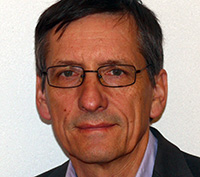National Research Council: keeping a watchful eye over basic research in Switzerland
The approximately one hundred members of the National Research Council play an important role in maintaining high-quality standards in Swiss basic research. Acting in a part-time capacity, they are committed to guaranteering research excellence and diversity.
The SNSF is of eminent importance to the Swiss research scene, promoting the diverse range of basic research activities being carried out in Switzerland. The nerve center of the SNSF is the National Research Council (NCR). With a membership of almost one hundred scientists, it meets around ten times per year for long, in-depth meetings in Bern to arrange funding for the best projects and junior researchers, using international reviews as the basis for its decision-making.
The NRC members are grouped into four divisions: three discipline-based divisions (Humanities and Social Sciences; Mathematics, Natural and Engineering Sciences; Biology and Medicine) as well as the Programmes division. There are also three specialised committees spanning all of the divisions (International Cooperation, Careers and Interdisciplinary Research). All of the members are distinguished researchers in their particular field. They are supported in their work by the SNSF Administrative Offices.
Productive appreciation
For many of the members, their work on the National Research Council is very close to their hearts. Talking to the 98 members, most of whom teach at Swiss higher education institutions, it is clear that they are very appreciative of the SNSF. Time and time again, they stress how important it is to them that they are able to give something back to the SNSF, and thus to the Swiss research community, in return for what they have been given during their careers.
Their voluntary commitment to the Research Council is a clear manifestation of this gratitude. It is certainly the case that sitting on the Council brings a great deal of renown and a high level of influence, with the members ensuring high-quality research in their disciplines and helping to shape Swiss research. However, members also have to commit to a great deal of work and to giving up a lot of their time. Thousands of projects need to be assessed every year. Anyone who chooses to sit on the Research Council needs to make sacrifices elsewhere, including giving up some of their leisure time.
Supporting the full range of research
The Research Council members also pursue overarching objectives through their work. Franz Caspar, for example, psychology professor at the University of Bern and Research Council member in the Humanities and Social Sciences division, also supports subjects from the humanities that are deemed to be more exotic, despite carrying out very use-inspired research himself. It is, he says, much easier to highlight the benefits of studies that save infants’ lives than those concerned with the religious history of prehistoric cultures. But this work too is valuable to society. He believes it is the Research Council’s role to promote research in all of its breadth.
Beatrice Beck-Schimmer, anaesthesiology professor at the University of Zurich and member of the Research Council in the Biology and Medicine division, is keen to see greater support for clinical research, an area that is still very much in the fledgling stage in Switzerland. She also believes in the importance of scientists being given enough time to carry out research, despite the many administrative tasks that are also required of them, and wants to see further improvements in equal opportunities, removing disadvantages for women. As the President of the Specialised Committee Careers, she is committed to ensuring that evaluations are carried out without any gender bias.
Improved mentoring
The SNSF supports many young aspiring researchers. These researchers represent the future of Swiss science. Ursula Keller, professor of physics at ETH Zurich and a member of the Research Council in the Mathematics, Natural and Engineering Sciences division is calling for the higher education institutions to improve their mentoring of young up-and-coming researchers. If these young scientists are insufficiently prepared for submitting their applications, they will be forced to revise their proposals and re-submit them, needlessly wasting time. Fabrizio Butera, professor in social psychology at the University of Lausanne and member of the Research Council in the Programmes division, is driving forward the implementation and evaluation of the National Centres of Competence in Research (NCCRs). These, he explains, have proved to be an excellent tool for the promotion of Swiss research in all disciplines. He is convinced that the practice of using longitudinal studies for investigating social and individual transformation processes in the social sciences would not exist today, were it not for the “LIVES”, “Democracy”, “Affective Sciences” and other NCCRs.
Swiss research benefits greatly from the work of the Research Council and the dedicated commitment and careful work of its members.



